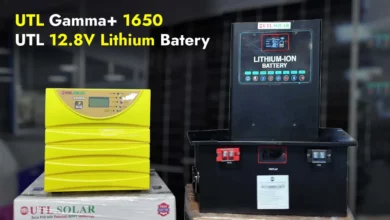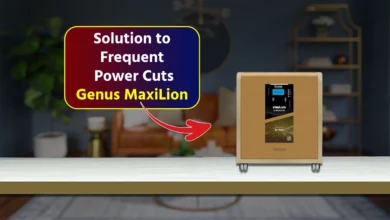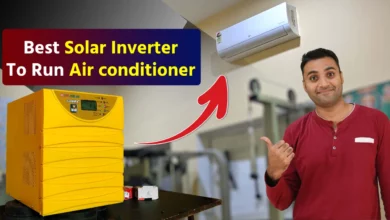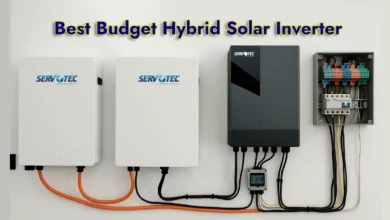What is a micro inverter and How does it work

What is a micro inverter and how does it work: A micro inverter is a small device that is installed behind the solar panel. Like other string inverters, a micro inverter also converts the direct current (DC) coming from the solar panel into alternating current (AC). But all the solar panels are installed separately on the micro inverter, so that the performance of all the solar panels can be tracked very easily. The efficiency of a micro inverter is also higher than that of a string inverter.
So if you also want to know what a micro inverter is and how it works, then complete information will be given in this post.
How does a micro inverter work?
Micro inverter is an electronic device just like string inverter, which converts DC electricity into AC electricity. But there are some differences between string inverter and micro inverter, due to which by installing micro inverter we get more benefits than string inverter.
Micro inverters come in different sizes. Some micro inverters can accommodate just one solar panel, some two, and some can accommodate up to four solar panels.
Key functions of micro inverters:
- DC to AC Conversion: Micro inverter takes DC supply directly from the solar panel and converts it into AC supply.
- Maximum Power Point Tracking (MPPT): Due to MPPT technology the efficiency of micro inverter is quite good.
- AC Output: The AC output from the micro inverter needs to be connected to the grid so that the power from the grid and the solar panel can combine to run your home’s load.
- Monitoring: The monitoring feature in micro inverters is very good. With this, we can monitor each panel separately and if there is a problem in any panel, we can easily replace it.
- Safety and Reliability: Micro inverter operates on low voltage, making it safer than other inverters.
Advantages and disadvantages of installing micro inverters
Advantages of installing micro inverters:
- Monitoring: The biggest feature of micro inverter is its monitoring capability. With this we can track the performance of each solar panel separately. If any panel gets damaged, we get to know immediately and we can replace it.
- Increased Efficiency: In string inverters, all the solar panels are connected in series, so if a panel gets shaded, the efficiency of the entire system decreases. But in micro inverters, all the panels are connected separately, so when shade falls, only the efficiency of the affected panel decreases, the rest of the panels generate electricity at full capacity.
- Safety: Micro inverters operate at low voltage, reducing the risk of high voltage damage and arc fires .
- Expansion: With 1 micro inverter you can create a solar system of up to 5 kW. If needed, you can expand your system to 10 kW by adding another micro inverter.
- Durability and Longevity: Micro inverters have a longer life than string inverters. This is why many micro inverter companies offer a warranty of up to 25 years.
Disadvantages of installing micro inverters:
- Cost: The cost of a micro inverter is higher than a string inverter. If a larger solar system is to be installed, more micro inverters will have to be installed, which increases the total cost.
- More Points of Failure: In a micro inverter, each panel is connected separately, which creates more connection points. Having more connection points also increases the risk of failure, so periodic checking is necessary.
The world’s first 5kw Microinverter
Why should micro inverters be installed?
- Ideal for shaded areas: If your rooftop is shaded, reducing the power generation of the solar panels, installing a micro inverter can help generate more power.
- Better monitoring: In micro inverters all the solar panels are monitored separately. If there is a problem in any one panel, we can easily identify and replace it.
- Safety and Reliability: Micro inverters operate at low voltage, making them safer than other inverters.
Best Micro inverter For Home
In the market, we get to see micro inverters of many companies. But every company gives some special feature in their micro inverters. Below you are given the list of top 5 micro inverter companies.
- Hoymiles – Offers affordable and efficient microinverters.
- Enphase Energy – Market leader in micro inverter technology.
- APsystems – Provides high-capacity microinverters.
- SMA – Known for premium-quality inverters.
- Chilicon Power – Specializes in smart microinverter solutions.
Conclusion:
Micro inverters prove to be better than other inverters in terms of efficiency, especially in places where there is shade. If you want to increase the efficiency of your solar system and have a more secure system, then you should consider using a micro inverter.






